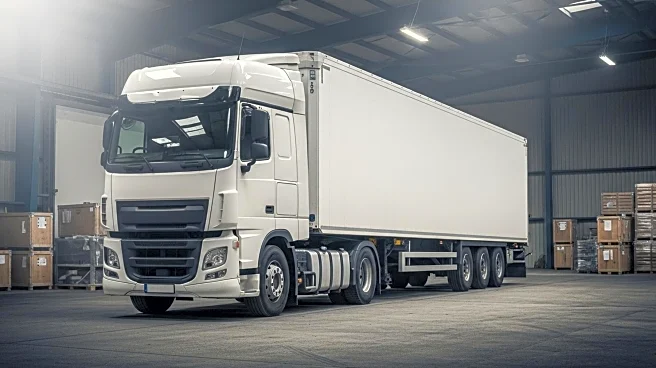What's Happening?
The trucking industry in the United States is undergoing a significant transformation as companies expand their services beyond traditional transportation roles. This shift is driven by the need to navigate a challenging marketplace, particularly during the ongoing freight recession. Trucking companies are increasingly offering a full spectrum of warehousing and supply chain solutions, including freight forwarding, inventory management, and warehousing. This diversification is seen as a natural extension of their existing services and is aimed at creating flexibility to better handle difficult environments. The expansion into new service areas is also a response to the changing demands of the marketplace, such as the increased emphasis on next-day and same-day delivery, which has led to a rise in shorter-haul trucking.
Why It's Important?
The diversification of services by trucking companies is crucial for their survival and growth, especially during economic downturns like the current freight recession. By expanding their service offerings, these companies can better manage supply and demand challenges and reduce their reliance on traditional truckload services, which have been particularly hard-hit. This strategic evolution not only helps trucking companies cope with tough times but also enhances their ability to serve shippers more effectively. By integrating more deeply into the supply chain, trucking companies can offer a more streamlined and efficient logistics process, ultimately benefiting their customers. This shift also reflects a broader trend in the industry towards more comprehensive supply chain solutions, driven by technological advancements and changing market demands.
What's Next?
As trucking companies continue to diversify their services, they are likely to further integrate into the supply chain, offering even more comprehensive solutions to their customers. This could involve expanding their warehousing capabilities, enhancing their freight forwarding services, and increasing their involvement in final-mile delivery. The ongoing evolution of the trucking industry will likely lead to stronger partnerships with shippers and a more integrated logistics landscape. Additionally, the use of innovative technologies such as fleet management software, warehouse management systems, and data analytics will play a crucial role in enabling this diversification and helping companies respond more agilely to market shifts.
Beyond the Headlines
The strategic evolution of the trucking industry has deeper implications for the logistics sector as a whole. By expanding their service offerings, trucking companies are not only enhancing their resilience but also contributing to a more integrated and efficient supply chain. This shift is likely to lead to long-term changes in the logistics landscape, with fewer players offering a broader range of services. This could result in a more streamlined process for shippers, reducing delays and optimizing the use of logistics services. Furthermore, the increased use of technology in the industry is expected to drive further innovation and efficiency, ultimately benefiting both trucking companies and their customers.









